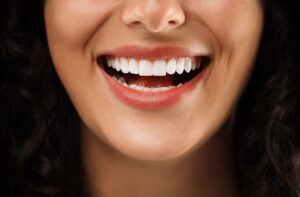When we think about oral health, we’re all taught about the importance of regular brushing and flossing and the role they play in protecting teeth and gums but what about the food we eat? The role of diet in maintaining strong, healthy teeth is often overlooked.
We’re only too aware that diet plays an important role in our overall health but less is known about the role that food and drink play in the protection of our teeth and gums.
So, in this post, we’ll delve more into that relationship and how various foods and beverages impact, or in some cases, assist dental health. So let’s get started.
The Connection Between Diet and Oral Health
Think about it this way…. Our mouths are in constant contact with food and drink, making them the first part of our body to experience their effects. Food interacts with the good and bad bacteria in our mouths, which can lead to either positive or negative outcomes for our teeth and gums.
While certain foods help to strengthen tooth enamel, neutralize acids, and provide the nutrients essential for oral health, others cause plaque buildup, erode enamel, and increase the risk of cavities. Therefore, understanding the role of diet in oral health and, in particular, which foods are good and bad for your teeth and gums can empower you to make better food choices leading to fewer dental issues in the future.
What about Foods That Promote Oral Health?
Of course, most things are good in moderation so if you follow the list below, do so, with this in mind.
Dairy Products (Cheese, Milk, and Yogurt)
Dairy products are excellent for dental health due to their high calcium and phosphorus content, which help strengthen and remineralize tooth enamel. Cheese, in particular, has been shown to increase saliva production. Saliva plays a pivotal role in oral health, helping to neutralize the acids in your mouth that lead to cavities. Additionally, yogurt contains probiotics that may benefit gum health by helping to reduce harmful bacteria.
Pro Tip: Opt for unsweetened yogurt to avoid added sugars, which can counteract any oral health benefits.
Crunchy Fruits and Vegetables (Apples, Carrots, and Celery)
There’s a reason apples are called ‘nature’s toothbrush’. Their fibrous texture helps clean teeth and stimulate gums as we chew. But it’s not only apples that share these amazing properties, carrots and celery also have a similar effect, acting like natural scrubbers for your teeth while promoting saliva production to rinse away bacteria.
Additionally, these fruits and vegetables are also rich in water, which further helps dilute sugars and acids in the mouth, reducing their damaging effects.
Leafy Greens (Spinach, Kale, and Lettuce)
Did you know that leafy greens like kale or spinach contain more calcium per serving than milk? So, as well as being good for your body, they’re also good for your teeth. Moreover, these superfoods also contain folic acid, a type of B vitamin that promotes gum health and may even reduce the risk of gum disease, particularly in pregnant women.
Nuts and Seeds (Almonds, Walnuts, and Flaxseeds)
Nuts are a great source of healthy fats, protein, and essential minerals like calcium and phosphorus. Almonds, in particular, are low in sugar and rich in calcium, making them a tooth-friendly snack. Additionally, chewing nuts stimulates saliva production, which helps rinse away food particles and neutralize acids.
Pro tip – Try to avoid nuts that are honey-roasted or spiced. Even though they’re delicious, they contain added sugar or salt that may not be overly good for your teeth.
Now we know what foods are good for your teeth and gums, it’s only fair that we examine foods that aren’t…
Foods and Drinks That Damage Oral Health
Sugary Foods and Beverages
Sugar is one of the biggest contributors to tooth decay. When we consume sugary foods and drinks, natural bacteria contained in our mouths feed on the sugar and produce acid as a byproduct. This acid attacks tooth enamel, leading to the formation of cavities.
Sodas, candies, cakes, and even certain fruit juices are loaded with sugars that can harm your teeth. Carbonated drinks are particularly problematic because they not only contain sugar but also acids, which double the damage to your enamel.
Pro Tip: If you do consume sugary foods, try to eat them with a meal, as saliva production is higher during mealtimes and helps neutralize acids. Alternatively, if you occasionally snack between meals, look to brush your teeth soon after or chew on sugar-free gum which can help to further stimulate saliva production.
Sticky and Starchy Foods (Chips, Bread, and Pasta)
Starchy foods like chips, bread, and pasta can get stuck in the grooves of your teeth, where they break down into sugars, contributing to plaque buildup. The longer these foods remain in contact with your teeth, the higher the risk of cavities.
Sticky foods, like gummies and dried fruits, are particularly harmful because they cling to the teeth, allowing sugar and acids to sit on the enamel for longer periods.
Acidic Foods and Drinks (Citrus Fruits, Vinegar, and Wine)
While citrus fruits like oranges and lemons provide essential vitamin C that the body needs, they’re highly acidic for teeth and can weaken enamel over time. Even though tooth enamel is the hardest substance in the body, acidic foods such as vinegar and beverages like wine contribute to enamel erosion. Once enamel is worn away, it cannot be regenerated, making teeth more susceptible to decay and sensitivity.
To minimize the impact of acidic foods, it’s best to consume them in moderation and rinse your mouth with water afterwards to help neutralize any acids.
Pro tip – If tooth enamel is worn, dental treatments like cosmetic tooth bonding can be applied to help protect teeth further.
Alcohol
Alcoholic beverages like wine, beer, and spirits are often high in sugar and acidity, making them particularly harmful to teeth. But alcohol also dries out the mouth, reducing saliva production, which, as we know, plays a critical role in washing away food particles and bacteria.
Pro Tip: If you drink alcohol, balance it out by consuming plenty of water to help keep your mouth hydrated and reduce acid buildup.
Ready To Take Charge of Your Oral Health?
Your diet plays a crucial role in determining the health of your teeth and gums. By being mindful of the foods and drinks you consume, you can pair a tooth-friendly diet with regular brushing, flossing, and dental check-ups to maintain optimal oral health.
Speaking of dental check-ups…
At Mint Dental, we’re here to support you on your journey to better dental health. Whether it’s time for a routine check-up or you’re experiencing a dental concern, our friendly team is ready to help you achieve a healthy, beautiful smile.
Contact us at (907) 318 1560 to schedule your appointment and take the first step towards lasting oral health.







